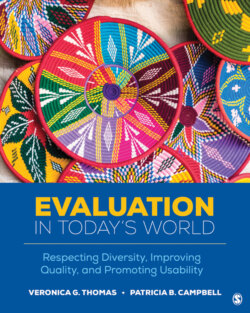Читать книгу Evaluation in Today’s World - Veronica G. Thomas - Страница 48
На сайте Литреса книга снята с продажи.
Reflect and Discuss: What Ethics Means to You
ОглавлениеMost adults have a vision or image in their mind of an ethical business, ethical organization, ethical government, or ethical society. On the individual level, ethics has a specific and oftentimes unique meaning and source. Using the prompts that follow, reflect on and discuss what ethics means to you.
What does ethics mean to you as a student, parent, spouse/partner, employee, and/or other roles?
What is the basis of your own ethical decision making and behaviors?
Questions adapted from Patton, M. (2002). Qualitative research and evaluation methods, (3rd ed.). Thousand Oaks, CA: SAGE
With today’s 24/7 cable news cycle, we are frequently bombarded with reports of unethical behaviors engaged in by businesses, politicians, and other professionals. Reported ethical infractions range from cheating (e.g., testing scandals in schools), stealing, and misuse of funds to inappropriate sexual behaviors, abuse of power, misrepresentations, and lying. Reports of these and other unethical behaviors, ultimately, erode confidence and public trust. As social, economic, and political discord manifests in myriad ways throughout the United States, many politicians, educators, activists, practitioners, and researchers, as well as the general public, have become increasingly attuned to the importance of ethics in navigating various aspects of our daily existence.
If evaluations are to be useful to program administrators, staff, participants, sponsors, and the public, the work must be planned, implemented, and disseminated in an honest, objective, and fair manner. In the American Evaluation Association’s (AEA, 2018a) Evaluator Competencies, the first competency listed under the professional practice domain is
1.1 Acts ethically through evaluation practice that demonstrates integrity and respects people from different cultural backgrounds and indigenous groups.
It is essential that evaluators conduct ethically grounded evaluations in the diverse settings in which they work. Ethically grounded evaluations are characterized by ongoing critical thinking, reflection, judgment, and decision making. This is squarely aimed at protecting the rights of stakeholders and building daily ethical routines into evaluation planning, implementation, and reporting. There is no separate stage in an evaluation during which ethical issues must be addressed; instead, they arise throughout the entire evaluation process and, thus, must be dealt with continuously. Ethical evaluations require evaluators with more than knowledge of ethics. They also need evaluators with sensitivities, such as the ability to recognize the ethical dimensions of a situation, and a commitment to ongoing ethical self-examination throughout their work. Furthermore, ethical issues in evaluation are not limited to highly egregious acts such as falsification or fabrication of data and violations of confidentiality, but they can also involve seemingly small, everyday decisions and behaviors such as what information or which stakeholders to engage or ignore, what data to collect or dismiss, and how and when to report the evaluative information.
This chapter examines evaluation ethics and quality standards that are expected to govern the behavior of evaluators and the outcomes of an evaluation. While ethical issues in evaluation undoubtedly extend beyond the behavior of the evaluator (to include others such as clients, sponsors, and users), this chapter is primarily concerned with the evaluator’s ethics in relation to various stakeholders within the evaluation context. The chapter begins with a brief historical perspective on research ethics, including the origins of our present-day approach to research ethics and ethical principles emerging from the Belmont Report, which serves as the foundation for protection of individuals involved in research and evaluation studies. The importance of ethics in evaluation and the discipline’s major professional guidelines and principles are discussed. The chapter’s content and activities are designed to help evaluators develop a keen awareness of how ethical issues can manifest themselves across all stages of the evaluation process, particularly in settings where there might be cultural incongruence and a cultural conflict of interest between the evaluator and the evaluation context.
